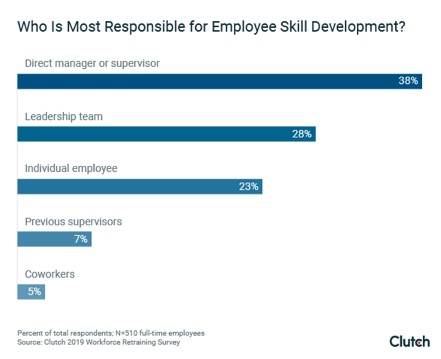by Sydney Wess
We all know that businesses value hard skills, as they’re often accurate barometers for how effectively you can perform. They’re also valued because they leave little room for subjectivity. You can either code in Python or you can’t.
However, soft skills, especially for those leading teams, are just as important. To build a strong team, the manager needs to understand how to coach employees effectively.
Managers should develop soft skills like teamwork, empathy, delegation, and adaptability, to provide the training your employees want. If not, your team will struggle to come together.
The challenge with soft skills is pinpointing the ones that have been developed, what should be developed, and the most effective avenues to improve those skills.
Experts recommend not determining your own competencies on soft skills alone. Ask leadership and other employees for their opinions on their soft skills to gain self-awareness in this area.
Once you’ve decided on target skills, it’s time to take action.
Read on about delegation skills
Here are some simple steps to holistically improve managerial soft skills:
- Institute a Leadership Development Program
- Commit to Regular Check-Ins
- Engage with Employees
Implementing each of these three measures will boost soft skills and the overall abilities of your managers.
#1 Way to Improve Soft Skills: Institute a Leadership Development Program
Businesses can opt to start leadership development programs to improve soft skills so managers can perform effectively. Companies like AT&T and Leidos both have programs dedicated to fostering these skills in team leaders.
AT&T invites external candidates to apply for the 2.5-year program, using their program to shape leaders from the ground up. This way they can ensure that managers have thorough and consistent training. The program serves as an opportunity for learning the ropes of the global company from different perspectives.
Government contracting company, Leidos, structures its leadership development program around investing in its current employees. It’s made available to current front-line, mid-level, and senior managers. The managers who are part of the program learn from each others’ experiences and challenges. From the company’s perspective, the program is designed “to develop effective, inclusive leaders that leverage diverse talent, ideas, and innovative solutions” to enable its business strategy.
Both programs put specific focus on effective team building and other soft skills.
Regardless of whether you choose to bring in new leaders with your program or provide soft skills training to your current seasoned employees, your company can benefit from promoting professional growth through managerial soft skills improvement.
#2 Way to Improve Soft Skills: Commit to Regular Check-Ins

Managers should frequently check-in with their own supervisors to discuss how their professional development is going. This presents a great opportunity for feedback and conversations on how soft skills can be improved. This is important because the vast majority of employees (66%) hold managers and leadership teams responsible for their professional growth. They believe that it’s on superiors to help them develop the knowledge needed to take on new projects.
As a business leader, you want to deliver for your employees. You also want them to be optimally equipped to handle commitments. Managers should meet with their supervisors for employee development discussions not only because it’s expected but also because your managerial skills will improve as a result.
Monitoring employee development as a personal metric for your soft skills will allow you to track your own progress alongside additional leaders within your company. Managers and supervisors have a lot on their plates, but can both improve their own skills by meeting to discuss employees.
#3 Way to Improve Soft Skills: Engage with Employees
The only way to help employees develop their skills is to get to know them. This requires spending time with individuals you lead outside of team meetings. Employees feel more inspired and motivated when they have one-on-one time with their boss. Provide it to boost morale. Additionally, both managers and employees have something to gain from getting to know each other. Each party will feel more enthusiastic about working together with someone they know, like, and support. It makes you feel more like a team.
According to a study conducted by Leadership IQ, superiors should be interacting with their team members ideally for 6 hours each week. At that level, employees feel most inspired about their workplace.
From Leadership IQ
The average person only spends about half that time interfacing with their superiors every week. In order to combat low levels of enthusiasm and boost your soft skills, simply spending time with employees goes a long way. Use your time with them to work on your designated soft skills.
Want to be a better listener for your team? Practice actively listening during conversations that aren’t about work. That’ll make everything even easier on the job.
Find opportunities to practice your skills. Your soft skills can only be improved with intentional practice. As a leader, look for opportunities to engage with employees, participate in professional development programs, and collect feedback from company executives and leaders.
More soft skills can be learnt during a Management 3.0 Workshop:

